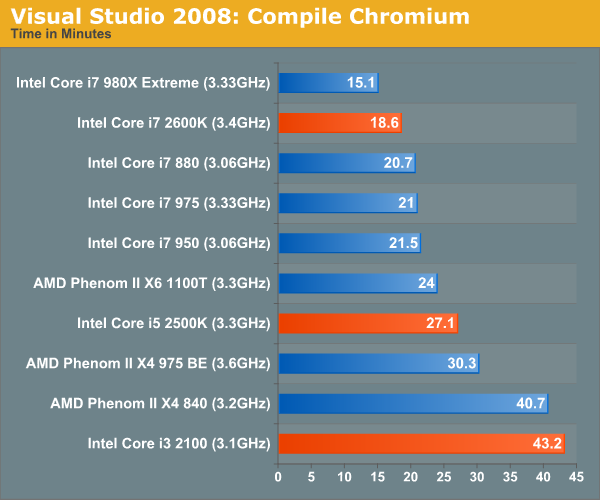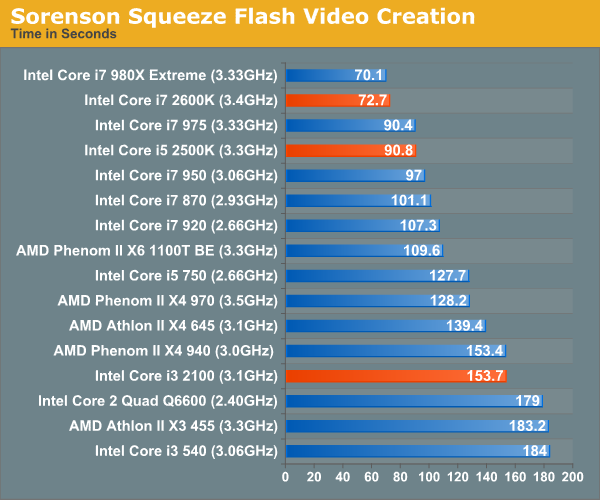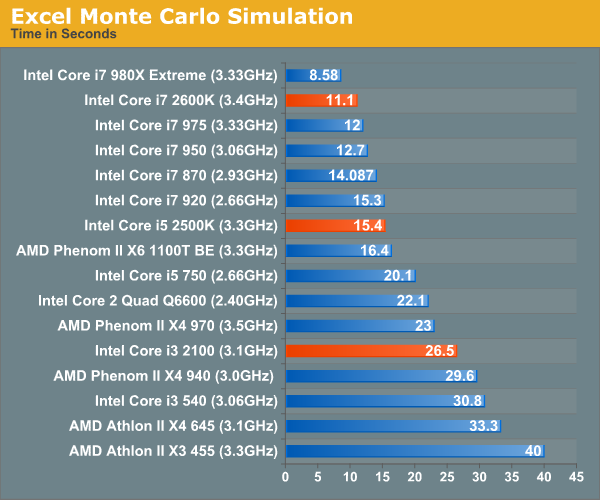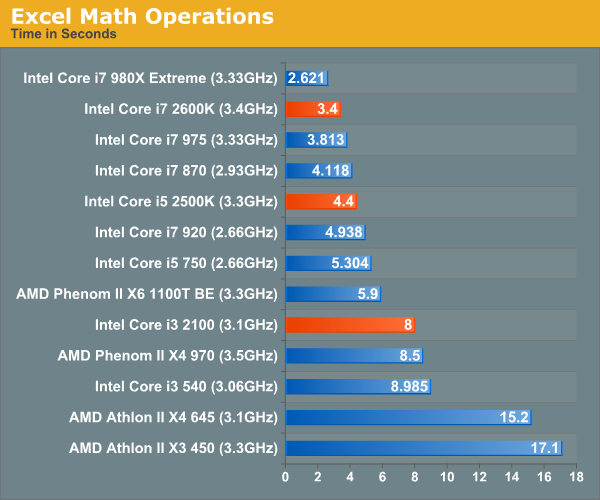The Sandy Bridge Review: Intel Core i7-2600K, i5-2500K and Core i3-2100 Tested
by Anand Lal Shimpi on January 3, 2011 12:01 AM ESTVisual Studio 2008: Compiler Performance
You guys asked for it and finally I have something I feel is a good software build test. Using Visual Studio 2008 I'm compiling Chromium. It's a pretty huge project that takes over forty minutes to compile from the command line on the Core i3 2100. But the results are repeatable and the compile process will stress all 12 threads at 100% for almost the entire time on a 980X so it works for me.
I don't have a full set of results here but I'm building up the database. The 2600K manages a 12% lead over the previous generation high end chips, but it can't touch the 980X. The 2500K does well but it is limited by its lack of Hyper Threading. The Phenom II X6 1100T beats it.

Flash Video Creation

Excel Math Performance












283 Comments
View All Comments
CreativeStandard - Monday, January 3, 2011 - link
PC mag reports these new i7's only support up to 1333 DDR3 but you are running faster, is PC mag wrong, what is the maximum supported memory speeds?Akv - Monday, January 3, 2011 - link
Is it true that it has embedded DRM ?DanNeely - Monday, January 3, 2011 - link
Only to the extent that like all intel Core2 and later systems it supports a TPM module to allow locking down servers in the enterprise market and that the system *could* be used to implement consumer DRM at some hypothetical point in the future; but since consumer systems aren't sold with TPM modules it would have no impact on systems bought without.shabby - Monday, January 3, 2011 - link
Drm is only on the h67 chipset, and its basically just for watching movies on demand and nothing more.Akv - Monday, January 3, 2011 - link
Mmmhh... ok...Nevertheless the intel HD + H67 was already modest, if it has DRM in addition then it becomes not particularly seducing.
marraco - Monday, January 3, 2011 - link
Thanks for adding Visual Studio compilation benchmark. (Although you omitted the 920).It seems that not even SSD, nor can better processors do much for that annoying time waster. It does not matter how much money you throw at it.
I wish to see also SLI/3-way SLI/crossfire performance, since the better cards frequently are CPU bottlenecked. How much better it does relative to i7 920? And with good cooler at 5Ghz?
Note: you mention 3 video cards on test setup, but what one is on the benchmarks?
Anand Lal Shimpi - Monday, January 3, 2011 - link
You're welcome on the VS compile benchmark. I'm going to keep playing with the test to see if I can use it in our SSD reviews going forward :)I want to do more GPU investigations but they'll have to wait until after CES.
I've also updated the gaming performance page indicating what GPU was used in each game, as well as the settings for each game. Sorry, I just ran out of time last night and had to catch a flight early this morning for CES.
Take care,
Anand
c0d1f1ed - Monday, January 3, 2011 - link
I wonder how this CPU scores with SwiftShader. The CPU part actually has more computing power than the GPU part. All that's lacking to really make it efficient at graphics is support for gather/scatter instructions. We could then have CPUs with more generic cores instead.aapocketz - Monday, January 3, 2011 - link
I have read that CPU overclock is only available on P67 motherboards, and H67 motherboards cannot overclock the CPU, so you can either use the onboard graphics OR get overclocking? Is this true?"K-series SKUs get Intel’s HD Graphics 3000, while the non-K series SKUs are left with the lower HD Graphics 2000 GPU."
whats the point of improving the graphics on K series, if pretty much everyone who gets one will have a P67 motherboard which cannot even access the GPU?
Let me know if I am totally not reading this right...
MrCromulent - Monday, January 3, 2011 - link
Great review as always, but on the HTPC page I would have wished for a comparison of the deinterlacing quality of SD (480i/576i) and HD (1080i) material. Ati's onboard chips don't offer vector adaptive deinterlacing for 1080i material - can Intel do better?My HD5770 does a pretty fine job, but I want to lose the dedicated video card in my next HTPC.